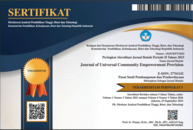Increasing the Creativity of Children with Special Needs through Waste Recycling
DOI:
https://doi.org/10.55885/jucep.v2i2.206Keywords:
Increasing, Creativity, Children With, Special Needs, Waste RecyclingAbstract
This study explores the potential of waste recycling programs to promote the creativity of children with special needs. The study is based on a review of qualitative data from parents, teachers, and program leaders who have participated in waste recycling programs with children with special needs. The results suggest that waste recycling programs can have a positive impact on the creativity, social skills, and self-esteem of children with special needs. By using recycled materials, these programs provide a unique and engaging way for children to explore and experiment with different materials and techniques, fostering a sense of creativity and innovation. Additionally, these programs provide opportunities for collaboration and teamwork, which can promote the development of social skills and the formation of positive relationships among program participants. These findings highlight the potential of waste recycling programs to be an effective tool for promoting the well-being and personal growth of children with special needs, and suggest that further research is needed to identify the key components of effective programs.References
Bletsch, T., Jiang, X., Freeh, V. W., & Liang, Z. (2011, March). Jump-oriented programming: a new
Abid, S. R., Murali, G., Ahmad, J., Al-Ghasham, T. S., & Vatin, N. I. (2022). Repeated Drop-Weight Impact Testing of Fibrous Concrete: State-Of-The-Art Literature Review, Analysis of Results Variation and Test Improvement Suggestions. In Materials 15(11). MDPI. https://doi.org/10.3390/ma15113948
Ahshan, R. (2021). A framework of implementing strategies for active student engagement in remote/online teaching and learning during thecovid-19 pandemic. Education Sciences, 11(9). https://doi.org/10.3390/educsci11090483
Baldo, D., Mecocci, A., Parrino, S., Peruzzi, G., & Pozzebon, A. (2021a). A multi-layer lorawan infrastructure for smart waste management. Sensors, 21(8). https://doi.org/10.3390/s21082600
Bennett, E. M., & Alexandridis, P. (2021). Informing the public and educating students on plastic recycling. In Recycling 6(4). MDPI. https://doi.org/10.3390/recycling6040069
Cai, W., Khapova, S., Bossink, B., Lysova, E., & Yuan, J. (2020). Optimizing employee creativity in the digital era: Uncovering the interactional effects of abilities, motivations, and opportunities.In International Journal of Environmental Research and Public Health 17, (3). MDPI AG. https://doi.org/10.3390/ijerph17031038
Ceatha, N., Mayock, P., Campbell, J., Noone, C., & Browne, K. (2019). The power of recognition: A qualitative study of social connectedness and wellbeing through lgbt sporting, creative and social groups in Ireland. International Journal of Environmental Research and Public Health, 16(19). https://doi.org/10.3390/ijerph16193636
Chen, S., Jiang, W., Li, X., & Gao, H. (2021). Effect of employees’ perceived green hrm on their workplace green behaviors in oil and mining industries: Based on cognitive-affective system theory. International Journal of Environmental Research and Public Health, 18(8). https://doi.org/10.3390/ijerph18084056
Fernandes, P. R. da S., Jardim, J., & Lopes, M. C. de S. (2021a). The soft skills of special education teachers: Evidence from the literature. In Education Sciences 11(3). MDPI AG. https://doi.org/10.3390/educsci11030125
Fernandes, P. R. da S., Jardim, J., & Lopes, M. C. de S. (2021b). The soft skills of special education teachers: Evidence from the literature. In Education Sciences 11, (3). MDPI AG. https://doi.org/10.3390/educsci11030125
Papakostas, G. A., Sidiropoulos, G. K., Papadopoulou, C. I., Vrochidou, E., Kaburlasos, V. G., Papadopoulou, M. T., Holeva, V., Nikopoulou, V. A., & Dalivigkas, N. (2021a). Social robots in special education: A systematic review. In Electronics (Switzerland) 10(12). MDPI AG. https://doi.org/10.3390/electronics10121398
Papakostas, G. A., Sidiropoulos, G. K., Papadopoulou, C. I., Vrochidou, E., Kaburlasos, V. G., Papadopoulou, M. T., Holeva, V., Nikopoulou, V. A., & Dalivigkas, N. (2021b). Social robots in special education: A systematic review. In Electronics (Switzerland) 10(12). MDPI AG. https://doi.org/10.3390/electronics10121398
Rodriquez, J., Lanser, A., Jacobs, H. E., Smith, A., & Ganguly, S. (2022). When the Normative Is Formative: Parents’ Perceptions of the Impacts of Inclusive Sports Programs. International Journal of Environmental Research and Public Health, 19(17). https://doi.org/10.3390/ijerph191710889
Rutkowski, S. (2021). Management challenges in chronic obstructive pulmonary disease in the covid-19 pandemic: Telehealth and virtual reality. In Journal of Clinical Medicine 10(6) 1–11). MDPI. https://doi.org/10.3390/jcm10061261
Sica, L. S. (2022). The COVID-19 Experience: Creativity as an Identity Attractor for Young People Facing the Developmental Challenges. International Journal of Environmental Research and Public Health, 19(15). https://doi.org/10.3390/ijerph19158913
Vale, J., Miranda, R., Azevedo, G., & Tavares, M. C. (2022). The Impact of Sustainable Intellectual Capital on Sustainable Performance: ACase Study. Sustainability (Switzerland), 14(8). https://doi.org/10.3390/su14084382
Zhang, B., Yang, L., Cheng, X., & Chen, F. (2021). How does employee green behavior impact employee well-being? An empirical analysis. International Journal of Environmental Research and Public Health, 18(4), 1–19. https://doi.org/10.3390/ijerph18041669
Downloads
Published
How to Cite
Issue
Section
License
Copyright (c) 2022 Journal of Universal Community Empowerment Provision

This work is licensed under a Creative Commons Attribution-ShareAlike 4.0 International License.
















